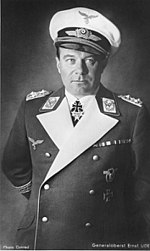About Ernst Udet
- Ernst Udet (26 April 1896 – 17 November 1941) was a German pilot during World War I and a Luftwaffe Colonel-General (Generaloberst) during World War II. Udet joined the Imperial German Air Service at age 19, eventually becoming a notable flying ace of World War I, scoring 62 confirmed victories by the end of his life.
- The highest scoring German fighter pilot to survive that war, and the second-highest scoring after Manfred von Richthofen, his commander in the Flying Circus, Udet rose to become a squadron commander under Richthofen, and later under Hermann Göring.
- Udet spent the 1920s and early 1930s as a stunt pilot, international barnstormer, light aircraft manufacturer, and playboy. In 1933, Udet joined the Nazi Party and became involved in the early development of the Luftwaffe, where he was appointed director of research and development.
- Influential in the adoption of dive bombing techniques as well as the Stuka dive bomber, by 1939 Udet had risen to the post of Director-General of Equipment for the Luftwaffe.
- The stress of the position and his distaste for administrative duties led to Udet developing alcoholism. The launch of Operation Barbarossa, combined with issues with the Luftwaffe's needs for equipment outstripping Germany's production capacity and increasingly poor relations with the Nazi Party, caused Udet to commit suicide on 17 November 1941 by shooting himself in the head.
- "Our defeat was caused by Udet," Hitler would claim.
- "That man concocted the most nonsensical state of affairs ever seen in the history of the Luftwaffe."
Read more at Wikipedia
See Also
- Famous People's Birthdays on 26 April, Germany
- Famous People's Birthdays in April, Germany
- Famous actor's Birthdays on 26 April, Germany
- Famous actor's Birthdays in April, Germany
- Famous politician's Birthdays on 26 April, Germany
- Famous politician's Birthdays in April, Germany
- Famous military officer's Birthdays on 26 April, Germany
- Famous military officer's Birthdays in April, Germany
- Famous flying ace's Birthdays on 26 April, Germany
- Famous flying ace's Birthdays in April, Germany
- Famous author's Birthdays on 26 April, Germany
- Famous author's Birthdays in April, Germany
- Famous fighter pilot's Birthdays on 26 April, Germany
- Famous fighter pilot's Birthdays in April, Germany
- Famous aircraft pilot's Birthdays on 26 April, Germany
- Famous aircraft pilot's Birthdays in April, Germany


 Date of Birth:
Date of Birth:  Place of Birth: Frankfurt, Hesse, Germany
Place of Birth: Frankfurt, Hesse, Germany
